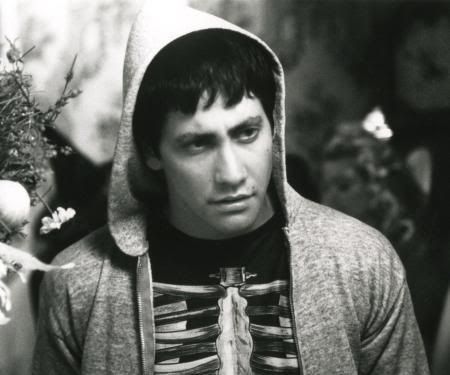As with Donnie Darko, The United States of Leland focuses on a darkly introspective teenage boy with flat affect and obvious, though unclearly defined, psychological problems. Ryan Gosling (Leland of Leland) even delivers his lines in the same shy, sparse, mumbling tone as Jake Gyllenhaal (Donnie of Donnie). There is a teacher with whom Leland shares his questions and theories, as there is for Donnie, and both characters date troubled yet gently supportive girls played by Jena Malone.
Ah, Jena Malone. It isn't relevant to mention her characters' names in either of these movies because they are the same person - a person whom I assume is also Jena Malone in real life. Ms. Malone is good at pulling off what little is expected of her: holding boys' hands, crying, dealing with the harsh realities life has dealt her (like her dad killing her mom or her boyfriend killing her brother), and talking like she is mildly upset.
"I'm Jena Malone, okay? My hair is greasy, okay? And...I just...I have some acne on my chin, okay? And my face is creepy in a chubby plastic doll way. But, you know, I have a lower back tattoo, okay?"


Jena Malone, wearing lots of foundation and showing off what some sleazy tattoo artist gave her (left). Jena just bein' creepy (right). Click the pictures for full effect.
Anyway, beyond similarities to Donnie Darko and the annoying gross-out factor of Jena Malone, The United States of Leland is actually composed around a fairly interesting story. There is a lot going on in the film. Each of the characters has at least one emotional subplot and (again, as in Donnie Darko) characters and stories become intertwined by the end of the movie, creating a sense of interconnectedness. Shown in clips juxtaposing the recent past with the presesnt (need I compare this as well?), the film recounts events and people involved in Leland's killing of a developmentally delayed boy. Although there is a much clearer storyline and more room for character development than in Donnie Darko, Leland is somehow less engaging. Whatever mood is set through the tensions of intellectual discussion, darkness, unnerving close-ups, and 80's music in Donnie Darko is absent in Leland. There is no atmosphere to the film and a disappointing lack of depth. Despite the charged plotline, the visual banality of Leland detracts from any real psychological participation. Leland's audience will surely not have the mysterious emotional ride they experienced in Donnie Darko.
The United States of Leland could have been a great look into the psche of a young murderer, somewhat in the vein of Primal Fear or Frailty (though without the plot twists) or even Murder by Numbers, another Ryan Gosling piece. Unfortunately, however, Matthew Ryan Hoge wanted to focus more on feeling than story, but only went half way. When isolation, confusion, and emptiness are the main gears utilized to drive a movie, more is needed than long pauses to set an appropriate tone. But perhaps it is improper execution of tone alone that keeps this film from breaking stylistic copywrights.


Two fate-obsessed main characters in their signature zip-up hoodies: Donnie (left) and Leland (right).